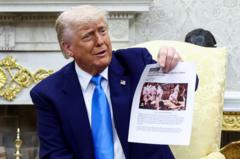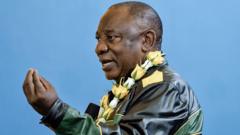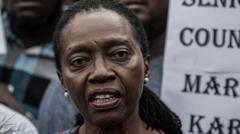In a dramatic Oval Office encounter, President Trump confronted South African President Cyril Ramaphosa, showcasing controversial claims about violence against white South Africans, reinforcing his administration's complex immigration policies.
Trump's Contentious Meeting with South African President Ramaphosa

Trump's Contentious Meeting with South African President Ramaphosa
A tense interaction at the White House highlights diverging narratives on race and immigration.
In a surprising exchange at the White House, President Donald Trump confronted South African President Cyril Ramaphosa, presenting videos and printed evidence he claimed illustrated a troubling rise in violence against white South Africans. During the meeting, Trump openly questioned the realities of South Africa’s socio-political landscape, repeatedly uttering, “Death, death, death,” while displaying graphics that Ramaphosa later disputed, mentioning he did not recognize the locations depicted in the footage.
The encounter has sparked criticism and concern, with political analysts pointing out that it demonstrated how a foreign leader attempted to provide a reality check to Trump, who instead appeared to promote fringe theories about racial persecution. While it is true that some violent incidents have been directed at white South Africans, official crime statistics indicate that they are not disproportionately targeted compared to other demographics within the nation.
This meeting unfolded against a backdrop of Trump's broader immigration stance, where he has accused the South African government of land grabs affecting white farmers. Notably, during his previous term, Trump proposed seizing farmers’ land for the American border wall—an irony not lost on many observers. Additionally, the administration continues to welcome white South African refugees amid a suspension of wider refugee programs.
As the administration's policies towards South Africa grow increasingly precarious, various factors have contributed to this contentious diplomatic relationship. Furthermore, legal battles continue over immigration practices, with recent court rulings indicating the administration unlawfully expedited deportations to South Sudan, revealing a targeted approach against specific groups that complicates the broader narrative of U.S. immigration policy.






















